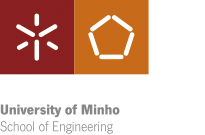Thursday, 6/29/2017
The students from the 1st
cycle degree in Fashion Design and Marketing (DMM) of the School of Engineering
of the University of Minho (EEUM) presented their final collections on the 2017
edition of UModa. The event took place on the 16th June 2017, at the
Platform of Arts and Creativity, in Guimarães.
As part of the event "Da UModa à Plataforma" and under the
"Fantasy" theme, the DMM students exhibited to the public their final
creations that merge the urban and fantasy worlds. The fashion show was organised by their
colleagues from the master in Fashion Design and Communication (DCM) of the
EEUM and gathered more than 300 people. UModa intends to expose the work
developed in the DMM programme, as well as in the DCM Master programme of EEUM.
This is already the fourth year in which the event was held outside the
University's facilities, which allowed for greater extent and dissemination to
the companies and the general public. "The field of fashion design
is constantly growing and, thus, competition increases every day. It is
important that the students apply all the learned knowledge, not only in
Design, but also in the area more related with Textile Engineering, as is the
case of Materials and Confection", reinforced Inês Amaral, event
coordinator and professor in the Department of Textile Engineering (DET) of the
EEUM.
The fashion show converged in the presentation of seven work groups that
developed collections for the autumn-winter season 2017/2018, with a display of
different pieces of clothing, footwear, jewellery, and others. The event
"Da UModa à Plataforma" comprised seven themes, one for each group:
- MAGRITTE,
inspired by the true theme of the event - "Fantasy". The group
interpreted "Fantasy" as something inherent to the mind, our
subjective view of the world and its surroundings. The development of the
garments was directly inspired by surrealist art, essentially from paintings
and movies;
- PERSONA,
where the Greek and Roman Theater was the main focus of the collection. The
group sought to portray the evolution of human identity, the personality of
each one and the capacity to adapt to different situations, such as one's
stance in the workplace before a superior and one's stance adopted in a greater
comfort zone among the people where one feels more at ease and trustful;
- KYKLOS,
inspired by the Circus. With this concept, the group's intention was to try to
break some criticisms, essentially those directed to people that are seen as
different, and to create a greater acceptance of different and unusual concepts
among people;
- HEAVEN AND
HELL, as an antithesis between heaven and hell. Heaven and hell is still a
subject of great controversy regarding beliefs and legends. These concepts turn
out to be two opposites that complete each other, and the group aspired to show
a direct comparison between the cycle of life and the beginning of biblical
life;
- WICCA, where
the group sought to materialise their spiritual values held in the
"Wicca" neopagan religion. This collection was based on the Celtic
supernatural, avoiding to dilute with visual stereotypes of witchcraft present
in the collective imaginary. This resulted in pieces with symbolic semantics
without any literal religious associations or appropriation of cult costumes;
- ALCHEMY,
associated with the mystery, magic, imagination, seeking satisfaction of the
deepest desires related to fantasy. The group portrayed the attempts to obtain
the "Philosopher's Stone" as the main endeavour of the alchemists;
- PARANOID, which
interconnected sensory images resulting from visual hallucinations with
psychological diseases related to dissociative disorders of identity.
As coordinator of this event, Inês Amaral has no doubts about the
feedback of the exhibition: "The final balance was very positive, the 300
seats were insufficient taking into account that more than 100 people attended
the fashion show standing. The students of the master's programme were very
satisfied with the final result, as the feedback from the public was very
positive. The students who presented the collection were also satisfied with
the organisation of the event and its projection". Regarding visibility
and importance of this event for the EEUM's promotion in the field of fashion and
design, DET's professor added that "with this type of events we can show
that in this School [of Engineering] and University, the learning process is
complemented by practical application".
The 1st cycle degree in Fashion Design and Marketing of the
EEUM aims to train fashion designers with solid integrated knowledge about the
user, market, materials, technologies and processes involved in the production
and development of fashion products. This transversal knowledge and skills
profile allows for an innovative and holistic approach to fashion product
design.
+ info: www.design.uminho.pt; Https://www.facebook.com/UModa.UMinho/

